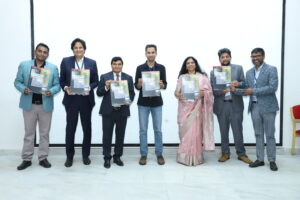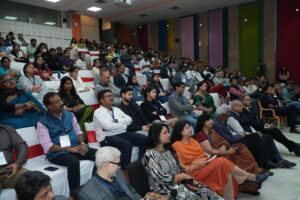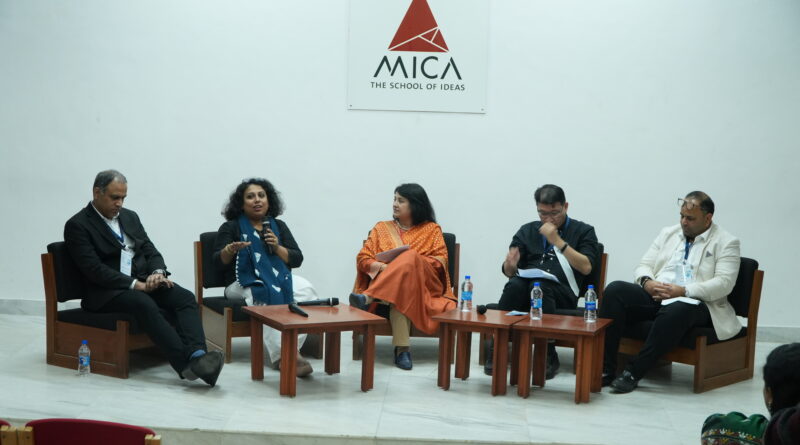Former Chairman of TRAI at MICA’S 10th International Conference on ‘Emerging Technologies’
BILKULONLINE
Ahmedabad, Jan 19:The emerging technologies will require greater collaborative efforts across the sectors within the country and globally both for co-creation, sharing of infrastructure as well as for protecting citizens from frauds and spam, said Dr. P D Vaghela IAS (retd.), former Chairman of Telecom Regulatory Authority of India (TRAI).

Delivering the keynote address at the 10th International Communication Management Conference (ICMC) at MICA Ahmedabad, Dr. Vaghela spoke about the opportunities and challenges of emerging technologies. He said, “While the era of emerging technologies holds immense promise for India and the world, bridging the digital divide and ensuring equitable access to emerging technologies are vital for the inclusive and sustainable development of societies and economies. Digital inclusion is not just a national concern; it is a global imperative.”
The first day of ICMC 2024 began with an inaugural ceremony featuring distinguished keynote speakers MN Ravishankar, Professor of Technology and Globalisation, Dean, and Head of Queen’s Business School, Queen’s University, Belfast, UK and Dr. PD Vaghela, IAS (retd.), Former Chairman, TRAI along with MICA President & Director Dr. Shailendra Raj Mehta, MICA Dean Dr. Githa Hegdge, faculty, staff, and researchers from across the globe.

Speaking about the challenges in adapting emerging technology, Dr. Vaghela said, “Concerns about trust and privacy surrounding AI’s data usage and potential misuse can create reluctance to adopt AI technologies. Every time new technologies are introduced, the likelihood of the poor, women and vulnerable sections getting excluded increases unless they are freshly trained and equipped to use new technologies. Unequal access to infrastructure, limited digital literacy, and affordability issues can hinder equitable access to new technologies, undermining all digital inclusion efforts.”
Dr. Vaghela concluded by saying, “While challenges exist, it is essential to acknowledge the positive impact of emerging technologies. These technologies have the potential to bridge gaps, empower individuals and communities, and drive economic growth. The explosive growth of digital technologies has created new possibilities and opportunities, making it easier for people to share ideas, learn new skills, and access quality education and health services.”
The event witnessed eminent personalities from academia, industry, and policymaking, marking the confluence of these diverse perspectives.
Distinguished keynote speaker Prof. MN Ravishankar said, “Immersive technologies are said to help people prepare for life and various situations. There is so much we can already know before going for field research. Preparation is the keyword when it comes to these technologies. Whether we can take advantage of that is up to you, but I would ask people to consider how these technologies can be used for preparation. If there is anything I think would be a game-changer, we can be prepared.”
The first day of the conference ended with a panel discussion on Immersive Technology and Experiences: Implications for Business and Society. The panel consisted of Vijay Viswanthan, Hamad Bin Khalifa Al Thani Professor of Integrated Marketing Communications and Associate Dean of IMC, Northwestern University, USA, Ashish Malik, Professor, Organization, Work, and Leadership, Queen’s Business School, Queen’s University, Belfast, UK, Ooi Keng Boon, Distinguished Professor of Industrial Management and Information Systems, UCSI Graduate Business School, UCSI University, Malaysia, Pooja Thomas, Associate Professor, MICA. Dr. Preeti Shroff, Professor and Director of IMC Executive Programs, Medill School for Journalism, Media, IMC, Northwestern University, USA, moderated the panel discussion.
The discussion covered vital themes such as leveraging immersive technology for remote collaboration, balancing automation and privacy considerations, and grappling with ethical dilemmas associated with its usage. Additionally, the discussion explored the transformative power of storytelling in immersive experiences and the infrastructural costs of setting up immersive technology.



